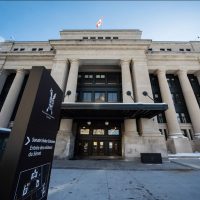News
Provinces and territories preparing for cannabis legalization
New Brunswick’s Minister of Health says delaying cannabis legalization would have a ‘negative financial impact’ on the province.
New Brunswick has passed “a comprehensive package of bills” in preparation for cannabis legalization, including the creation of a fund that will use revenue from cannabis sales to educate the public on responsible use, the provincial minister of health told a Senate committee last week.
Minister Benoît Bourque told the Standing Senate Committee on Social Affairs, Science and Technology that licensed cannabis producers in the province will contribute two per cent of their gross sales to the fund.
“The Cannabis Education and Awareness Fund will help the province deliver on its responsible use and corporate social responsibility policies through financial support for research and program development in numerous areas, including programs for schools, consumer information and harm prevention measures,” he told the committee on May 9, 2018.
Other provinces are also developing their own cannabis public education campaigns, including Manitoba, to build on the $110-million the federal government has already earmarked for such programs. An ongoing federal program, launched in November 2017, has reached millions of young Canadians so far.
New Brunswick’s preparation for legalization reflects a country-wide effort on the part of provinces and territories, which includes the setting of the legal age of consumption, method of distribution and other responsibilities.
Minister Bourque told the committee that New Brunswick is well prepared for the original July 2018 target date for legalization, and that any delays would have a “negative financial impact” on the province.
The committee is in the midst of an indepth review of the legislation, including the consideration of reports from four other Senate committees that zeroed in on particular elements of the bill. The committee will report back to the Senate as a whole ahead of a final vote on the bill on June 7.
As the Senate continues its study of the bill, provinces and territories are readying for the production, distribution and sale of cannabis. Most provinces and territories have set 19 as the legal age to buy and possess cannabis, with the exception of Alberta and Quebec, which have set the legal age at 18 (in line with the provincial age to purchase alcohol).
The federal legislation details that youth between 12 and 18 will not be prosecuted possessing up to five grams of cannabis to prevent young Canadians from having criminal records. Provinces and territories plan to enforce a prohibition for youth with non-criminal measures, such as ticketing.
Here’s a snapshot of where the provinces and territories are at in preparing for the legalization of cannabis in Canada.
Alberta
The Alberta Gaming and Liquor Commission (AGLC) will oversee cannabis licensing, distribution and regulations to private retailers. The AGLC will also be the sole online retailer permitted to operate in the province.
British Columbia
The BC Liquor Distribution Branch will be the sole wholesale distributor, providing cannabis from federally licensed producers to public BC Cannabis Stores and private retail cannabis stores. It will also operate public online sales of cannabis.
Manitoba
Manitoba Liquor & Lotteries will be the wholesale distributor, responsible for securing and tracking cannabis from federally licensed producers to private retailers. The renamed Liquor, Gaming and Cannabis Authority of Manitoba will be responsible for licensing cannabis stores and cannabis distributors.
New Brunswick
A subsidiary of NB Liquor, called CannabisNB, will operate provincial cannabis retail stores. The province has announced the locations of 20 cannabis stores across the province so far – with 11 stores to open as early as July 2018 and an additional nine stores opening as early as September 2018.
Newfoundland and Labrador
Cannabis NL, a division of Newfoundland Labrador Liquor Corporation, will be the regulator and distributor of cannabis, responsible for providing licences to private retailers to sell to the public. At the outset, it will also be the online cannabis retailer and could operate retail stores in areas where there is no interest from private retailers.
Northwest Territories
The NWT Liquor Commission will be responsible for importing and selling cannabis. Though cannabis will only initially be available in liquor stores, “there may be the opportunity for retail locations outside of the liquor stores operated under contract with the NWT Liquor Commission,” according to the territory.
Nova Scotia
The Nova Scotia Liquor Corporation will be the only authorized seller of cannabis, both in existing stores and online. So far, 12 existing NSLS locations have been authorized to sell cannabis following legalization.
Nunavut
The Government of Nunavut has been consulting since July 2017 on how to best control cannabis in the territory. Proposed legislation is currently before the Legislative Assembly of Nunavut.
Ontario
The distribution and sale of cannabis will be managed by the province through the Ontario Cannabis Store. Ontario plans to open 40 stores by the summer of 2018, with an expected 80 stores by 2019 and 150 stores by 2020.
Prince Edward Island
The Prince Edward Island Liquor Control Commission will oversee the operation of four cannabis stores upon legalization. It will also acquire the cannabis from federally licensed producers for distribution to stores. The province is also planning for online sales.
Quebec
The new Société québécoise du cannabis, an independently run subsidiary of the Société des alcools du Québec (SAQ), will manage the distribution and sales of cannabis. Some 20 retailers will open following legalization, and will also handle online sales. Cannabis will not be sold in the same stores as alcohol.
Saskatchewan
Saskatchewan Liquor and Gaming Authority will issue permits to private cannabis wholesalers and private non-medicinal cannabis retailers. Wholesalers will be permitted to buy cannabis from federally licensed producers to supply private retailers in the province. The province expects to initially select 51 stores in 32 communities across Saskatchewan, with plans to potentially increase the number of stores in 12 to 18 months.
Yukon
The Yukon Liquor Corporation will be responsible for the distribution of cannabis upon legalization. Once regulations have been passed, the Cannabis Licensing Board will be responsible for issuing licences to private cannabis retailers.





















































